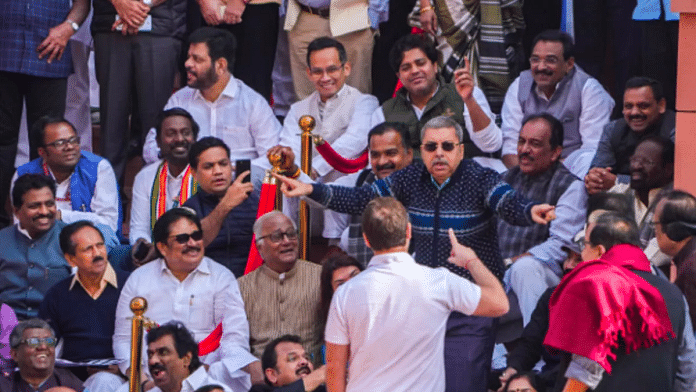The suspension of 146 Opposition MPs from Parliament has ignited widespread discussion and debate in India. It followed after the lawmakers questioned the Narendra Modi government on the 13 December security breach in Parliament, a valid concern. The suspension was labelled as the “murder of democracy” by the MPs, while supporters justified the action by alleging that the legislators’ behaviour during the debate was unruly. This justification appears weak in light of instances such as BJP MP Ramesh Bidhuri getting away with abusing BSP MP Danish Ali in Lok Sabha.
This isn’t the first time MPs have been suspended for protesting. BJP MP SS Ahluwalia pointed to a similar case in 1989 under the Rajiv Gandhi government. But citing this example as a justification is a fallacy – it’s like saying that any action of the current government can be justified because the Congress too did it in the past.
Rather than delving into whataboutery, the primary concern in this issue should be on determining whether there exists a defined procedure to typify unruly behaviour and justify the suspension of a parliamentarian. If such rules exist, it’s crucial to examine their logical coherence and ensure they do not impede the Opposition’s ability to express their views in Parliament. Ultimately, in a democratic system, elected representatives should enjoy the freedom to voice their opinions without constraints.
Also read: Get over the idea that a Speaker is above party politics—Parliament to Maharashtra assembly
Changing views
Taking a stroll through history, it is evident how political parties and their staunch supporters tend to shift their positions depending on their affiliations. In the past few years, the BJP government has accused the Opposition of disrupting parliamentary proceedings, forgetting that party members expressed contrary views in the past. In September 2012, Sushma Swaraj, then the Leader of Opposition in the Lok Sabha, said: “Obstructing the functioning of Parliament is, in essence, a form of democracy.” Arun Jaitley, then the Leader of Opposition in the Rajya Sabha, said: “There are moments when impeding Parliament can lead to greater benefits for the country.”
The key takeaway for Indians is to discern and recognise that the fundamentals of democracy transcend political parties. While opinions may vary, it is imperative for Indians to stand firmly for these principles.
Also read: Spare Parliament of one-upmanship. BJP needs to be tactful to counter opposition’s theatrics
Mimicry & mockery
What is truly baffling is the aftermath of the suspension, especially TMC MP Kalyan Banerjee’s mimicry of Vice President Jagdeep Dhankhar and the subsequent narrative war. While the mimicry was distasteful, it certainly does not equate to a disregard for our institutions. In a democracy, the tapestry of expression includes mockery, mimicry, and protests against public figures—even if we may not like it.
Moreover, it was absurd to see Dhankhar accuse the Opposition of attacking his Jat and farmer background. His identity held no relevance to the entire incident. It’s perfectly valid for him to be upset about the mimicry, but there were no derogatory remarks about his identity, unlike Ramesh Bidhuri’s communal slurs against MP Danish Ali or the 1995 incident where explicitly casteist abuses were used against BSP leader Mayawati.
The primary duty of the presiding officer is to facilitate the expression of opinions in Parliament. But playing the identity card to portray oneself as a victim, especially when identity wasn’t even a part of the discussion, appears to be a desperate attempt to manipulate the narrative in favour of the Vice-President. This tactic is not only dishonest but also a way to evade the debates that the Opposition is earnestly seeking.
Beyond political affiliations, the essence of democracy lies in upholding principles—fairness, transparency, and the unyielding right to dissent.
Amana Begam Ansari is a columnist and TV news panelist. She runs a weekly YouTube show called ‘India This Week by Amana and Khalid’. She tweets @Amana_Ansari. Views are personal.
(Edited by Humra Laeeq)



